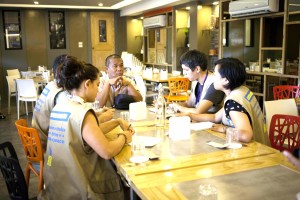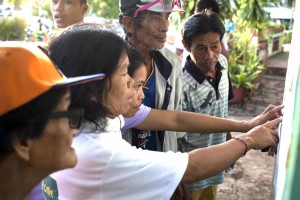
International Observers interview Jerome Griliandas, Regional Director of COMELEC, Bohol. LILLI BREININGER
SAN FRANCISCO — It is common knowledge that only 46 percent of Americans are registered voters and typically only 55 percent of them turn out to vote. With such low turnout, questions can be raised about how truly representative elected officials are in the U.S.
No such doubt, it seems, can be said about Philippine elections, whose latest edition on May 9th elected a new president with an at least 80 percent turnout.
With this backdrop, my experience in the Philippines as part of an observers mission had even more significance for me as a young Filipino American. I was part of COMPACT International Observers Mission for a Peaceful and Democratic Elections, a project of the Active Citizenship Foundation.
COMPACT’s first mission was in 2004 and it has since received feedback that the presence of its foreign observers prevented election-related violence. Each mission is accredited by the COMELEC and completes a final report with recommendations to the COMELEC at the end of its work.
This was my first trip to the Philippines since I was two years old and I was excited to return to the motherland in a participatory manner. I am not new to electoral work having been part of a local effort to expand voting rights to 16- and 17-year-olds in San Francisco. My Philippine experience was a valuable opportunity to see how elections worked in the Philippines and what drew people’s engagement.

Voters verifying their voting precinct, Barangay Tawala, Panglau, Bohol on Election Day, May 9. LILLI BREININGER
I was part of a group of 15 observers, from the US, Sweden, Japan and Germany. The four of us from the US were all Filipino Americans. Observers were sent to four destinations on the COMELEC’s list of Election “Hot Spots”: Dinagat, Isabela, Maguindanao and Bohol.
Upon my arrival on the island of Bohol, our local contacts confirmed that the island had been very peaceful, except for one killing a few weeks before of a party-list rally emcee. However, they claimed that the highest individual payments to illegally buy votes were transacted on their island.
Over the next two days we met with members of the Philippine National Police (PNP), Parish Pastoral Council for Responsible Voting (PPCRV), candidates, leaders and voters. Everyone confirmed that Bohol had been peaceful leading up to the elections, but that vote-buying, the practice of passing out money with a name or sample ballot stapled to it, was rampant and considered normal.
On Bohol, vote-buying is referred to as inagayan, a “shower” that voters receive from candidates, usually distributed in three increments. The PNP claimed that they could not investigate without a formal complaint filed. Some candidates admitted to buying votes and remarked that a candidate could not win without it. This practice is sustained by local political dynasties that have relied on it for generations. We met only one incumbent candidate who prided herself on not buying votes and continuing to win year after year.
On election day we observed the delivery and setting up of the VCMs (Vote Counting Machines) and voting precincts The poll workers, or BEIs (Board of Election Inspectors), appeared to be well trained on how to set up the new VCMs.
By 6 a.m., dozens of voters were already lined up to vote. Throughout the day we visited a dozen other precincts, witnessing a few delays with the VCMs: paper jams and overheating and often the slow arrival of technicians.
Where VCMs were down, precincts acquired a pile of completed ballots that could only be inserted later once the machines were running again, putting the secrecy of each voter’s ballot at risk and increasing the possibility ballot-tampering.
In the afternoon we were approached by a local observer who received messages from an island-barangay that voters’ receipts were not listing the mayor they voted for. Another international observer and I ventured to the island, an hour away by boat.
International Observers from the U.S. Germany, and Sweden at the press conference, Quezon City, Manila, May 6, 2016. LILLI BREININGER
After walking through the precincts, we spoke to a community elder while a crowd of a hundred voters surrounded us to listen.
She claimed that they had been harassed every day leading up to the election by incumbent officials, including being threatened with having their Pantawid Pamilyang Pilipino Program cut off. The program, also known as 4 Ps, is a conditional cash transfer to the most impoverished families in exchange for keeping children in school; it is run by the Department of Social Welfare and Development.
The local PNP also informed us of taunting and booing that occurred between large groups of voters earlier that day, which they had to disperse. At day’s end there was no signal to enable the transmission of the final results to COMELEC.
The BEIs and poll watchers decided to stay overnight in the precinct to secure an honest count until the arrival of a technician the next day, or the possibility of bringing the VCM to the mainland for a better Internet signal.
Overall our mission found the election process generally credible, although more measures can be taken to secure the secrecy of votes within precincts. We commended the hard work of the BEIs to maintain fair and accessible voting precincts, highlighting that women teachers primarily filled these roles.
We also suggested that advancing voter education would greatly support the development of democracy in the Philippines and needed to truly challenge the persistence of political dynasties and the practice of vote-buying.
At our final press conference in Bohol, my colleague Cindy Domingo underscored the point that a full democracy can only happen once everyone also has a right to education and a means for a sustainable livelihood.
For me, democracy has meant one’s ability to affect one’s own livelihood, elections being just one of those means. My experience as an observer has greatly informed the way I value my work to expand voting rights to 16- and 17-year-olds here in San Francisco.
This effort, also known as Vote16, will be on the ballot in November, in the city of San Francisco. I hope it will contribute to better voter education here and the emergence of of better voting habits starting at an early age.
RELATED STORY
Foreign observers report incidents of vote-buying, violence

